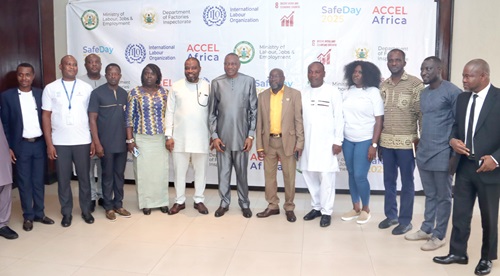The Minister of Labour, Jobs and Employment, Dr Abdul-Rashid Pelpuo, has called on employers to invest in safety technologies and involve workers in their implementation.
That, he said, was to ensure safety and enhance workplace productivity.
"On the other hand, workers must embrace lifelong learning, seizing opportunities to acquire new skills and advocating for their rights to a safe workplace.
"As policymakers, we owe it an obligation to formulate laws that protect and empower workers in technology-driven environments," Dr Pelpuo said at this year's World Day for Safety and Health at Work, in Accra yesterday.
The event is on the theme: "Emerging Technologies and Their Impact on Workers' Health and Safety".
Reminder
Dr Pelpuo said the day served as a powerful reminder of the collective duty of all in ensuring that every worker in Ghana worked under a safe and secure working environment.
He said the International Labour Organisation had estimated that over 2.78 million workers globally lost their lives annually to occupational accidents and diseases.
Those developments, he said, underscored the urgency to do things differently to see better results.
Since assuming office, Dr Pelpuo said he had been overwhelmed by the support he had received from the tripartite partners across the country, and "I pledge to stand with you in promoting decent work and standards in all sectors of the economy."
He said in recent years, the world of work had evolved rapidly and that the influx of artificial intelligence, robots and data-driven systems was transforming the way "we work, the tools we use, and the environment we operate in".
Safety measures
The need for robust safety measures at the workplace, he said, was, therefore, undeniable and that high-risk sectors such as construction and mining reported over 1,000 occupational injuries annually, a sobering statistic that reflected the daily risks faced by workers.
"Similarly, about 60 per cent of the workforce operates in the informal economy, even without access to basic safety protection.
“These smart tools monitor workers' health in real time, detecting signs of fatigue or exposure to hazardous conditions, and alerting supervisors to intervene before accidents occur.
"Mainstreaming these technologies provides the impetus to prevent injuries, save lives, and create workplaces where safety is not an afterthought but a fundamental priority," he said.
Dr Pelpuo said the impact of emerging technologies on workers' health and safety could not be overemphasised, saying that globally, poor workplace safety was estimated to cost economies about four per cent of Gross Domestic Product annually in loss of productivity and medical expenses, a burden Ghana could not afford.
Those figures, he said, "compel us to act decisively, leveraging the tools of the modern age to protect our workers and unlock the full potential of our nation.
The rise of automatism, particularly in industries like manufacturing, raises concern about job displacement as machines increasingly perform tasks once executed by humans."
Support
Without adequate support, workers risk being left behind, facing economic uncertainty and exclusion from the labour market.
Furthermore, cybersecurity threats pose a growing danger as compromised technology-driven systems could endanger workers, particularly in high-risk sectors.
These challenges require a proactive, worker-centred approach to ensure that technology serves as a force for good.
He said the government of President John Dramani Mahama remained committed to harnessing technology to advance safety and health at their workplace.
That, he said, included making substantial investment in health infrastructure, modernising facilities and equipping workplaces with the tools needed to integrate technology safety.
In a solidarity message, the Secretary General of the Trades Union Congress (TUC), Joshua Ansah, charged workers “to double their game”.
He said it was a collective duty to make every workplace healthier and safer.
The Chief Inspector of Factories, George D. Gashon, said there was the need to upscale training in health and safety in all organisations.
“Safety committees should be in every organisation; they should be meeting and discussing safety, and we would be taking all those inputs before certification.
That task force is there to ensure that if you need training, it would help you with that,” he said, adding that technological training was also important.

